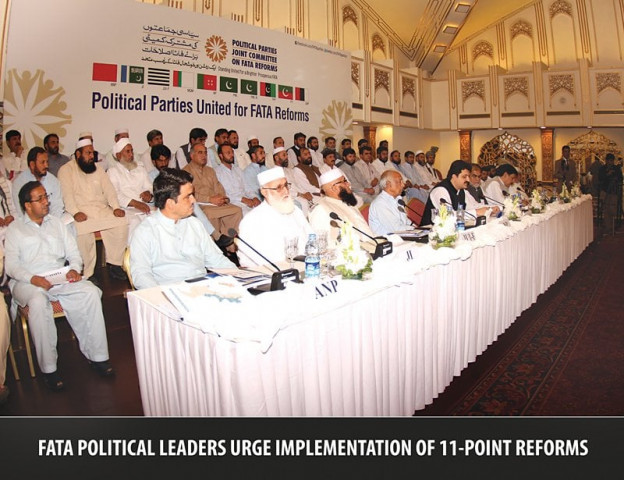Mainstreaming FATA: Shifting of powers from president to parliament urged
Speakers for transparency, accountability in FATA admin, budget.

The demands were mostly agreed on unanimously. PHOTO: EXPRESS
They called for extending the parliament’s powers to Fata and shifting of legislative powers from President to the parliament.
They shared their recommendations with media at the conclusion of a two-day conference on issues being faced by the tribal people and reforms at a local hotel here on Wednesday. They demanded implementation of the 11-point recommendations by the Joint Committee of political parties.
The recommendations include democratising the jirga system, abolishing the Actions in Aid of Civil Power Regulation, and extending the Pakistan Electronic Media Regulatory Authority (PEMRA) jurisdiction to FATA.
The participants also emphasised on the urgent need to hold local bodies’ elections in the violence-hit area and a comprehensive package for its infrastructure development, with special focus on health, education and employment.
The committee also recommended that political agents’ executive and judicial powers must be separated and that people should be guaranteed their fundamental right to property and inheritance.
Senator Zahid Khan from ANP stated that there was no way out other than implementing Fata reforms. “How long can the affairs of an important area be run in isolation in the 21st century,” the outspoken senator questioned.
It is sheer injustice to keep them apart from other settled areas of Khyber-Pakhtunkhwa, he added.
“If peace can be restored in the troubled area like Malakand than why not here [Fata],” he maintained.
Mukhtar Bacha, provincial chapter chief of National Party (NP) Khyber-Pakhtunkhwa argued that for many years Fata had been a launching pad [into] Afghanistan but for the last over a decade the establishment has been calling all the shots in the area and the Frontier Crimes Regulation (FCR) has virtually become non-functional.
However, he hoped, after the drawdown of foreign forces from Afghanistan and elimination of militant groups a legislation by parliament could replace the FCR because the letter would no longer be workable in Fata.
“They [government] have to do it because there is no other choice,” he added.
During the two-day deliberations, FATA-based party leaders emphasised the importance of implementation of the 2011 reforms and the FATA committee’s 11 points. Tribal leaders also highlighted the need for increased attention to transparency and accountability in FATA administration and budget process.
“The ten political parties represented on the Political Parties Joint Committee on FATA Reforms acknowledge that the people of the FATA deserve the same rights, freedom, protection and economic opportunities as all Pakistanis. We believe that political, economic, social and administrative reforms in the tribal areas are necessary to obtain sustainable peace and development in FATA,” the press release reads.
Local activists called on the government to hold regular consultation with political parties and address the needs of the people of FATA, particularly issues of the internally-displaced persons (IDPs).
The FATA political leaders also urged the media, civil society, and parliamentarians to proactively play their role in implementing the reforms, saying it will also ensure peace in the tribal areas.
The joint committee, which is comprised of representatives from all major political parties, including Pakistan Muslim League-Nawaz (PML-N), Pakistan People’s Party (PPP), Awami National Party (ANP), Jamiat-i-Ulema-i-Islam-Fazal (JUI-F), Jamaat-i-Islami (JI), Muttahida Qaumi Movement (MQM), National Party (NP), Pakistan Tehrik-i-Insaf (PTI) and Qaumi Watan Party (QWP), had agreed on the 11-point consensus agenda for political reforms in FATA.
The committee has presented the recommendations to K-P Governor Mehtab Abbasi, members of the Senate Standing Committee on Defence, as well as the State and Frontier Regions Minster Lt-Gen (retd) Abdul Qadir Baloch.
The committee plans to meet the president, prime minister and parliamentary committees soon to discuss the reforms agenda with them.
Published in The Express Tribune, June 12th, 2014.



















COMMENTS
Comments are moderated and generally will be posted if they are on-topic and not abusive.
For more information, please see our Comments FAQ